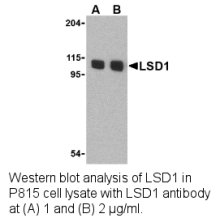Anti-Human LSD1 (NT)
Data
- -
- -
Antibody DetailsProduct DetailsReactive Species Human Host Species Rabbit Immunogen PN:L176 Product Concentration 0.5 mg/ml Formulation This polyclonal antibody is formulated in phosphate buffered saline (PBS) pH 7.4 containing 0.02% sodium azide as a preservative. Storage and Handling This polyclonal antibody is stable for at least one week when stored at 2-8°C. For long term storage, aliquot in working volumes without diluting and store at –20°C in a manual defrost freezer. Avoid Repeated Freeze Thaw Cycles. Country of Origin USA Shipping Next Day Ambient RRIDAB_2831138 Each investigator should determine their own optimal working dilution for specific applications. See directions on lot specific datasheets, as information may periodically change. DescriptionDescriptionSpecificity Rabbit Anti-Human LSD1 recognizes on epitope near the amino terminus of human, mouse and rat LSD1. This polyclonal antibody was purified using affinity chromatography. Background Histone modifications mediate changes in gene expression by altering chromatin structure or by serving as a platform to recruit other proteins. LSD1 is a recently discovered amine oxidase that catalyzes the lysine-specific demethylation of histone proteins via an FAD-dependent oxidative reaction (1). Methylation on histone H3-K9 is thought to play an important role in heterochromatin formation, while methylation on arginine and some lysine residues (such as H3-K4) is associated with active transcription (2). LSD1 associates with various proteins, including HDAC1/2, CoREST, and BHC80, that act to regulate LSD1 activity in vivo, and in a histone H3-K4-specific methylase complex that is involved in transcriptional regulation (3,4). Experiments have shown that CoREST, a SANT domain-containing corepressor (5) acts to enhance LSD1 activity, while BHC80, a PHD domain-containing protein (6), inhibits CoREST/LSD1 activity in vitro (3). LSD1-mediated histone demethylation thus may have significant effects on gene expression. PubMed References & Citations1. Shi, Y. et al. (2004) Cell 119:941 2. Kouzarides, T. (2002) Curr. Opin. Genet. Dev. 12:198 3. Shi, Y. et al. (2005) Mol. Cell 19:857 4. Nakamura, T. et al. (2002) Mol. Cell 10:1119 Technical ProtocolsCertificate of Analysis |
Related Products
- -
- -
Prod No. | Description |
|---|---|
L173 | |
L174 | |
L175 | |
L176 |



